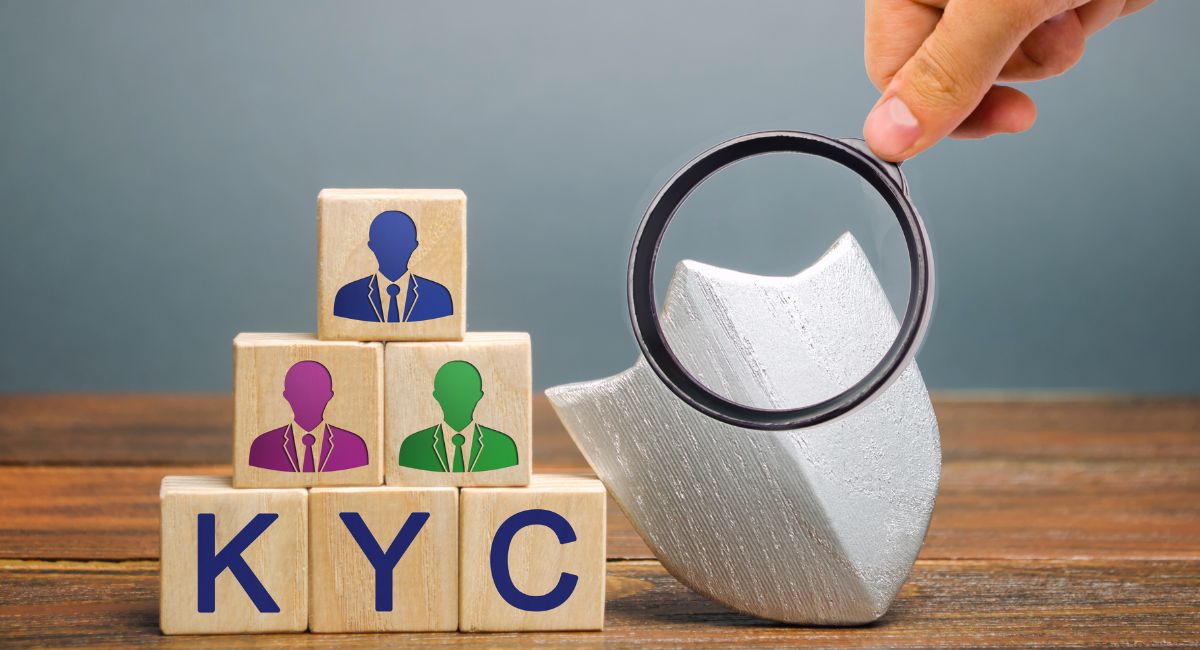Navigating the dynamic landscape of cryptocurrency trading, one acronym consistently echoes with undeniable significance – KYC or Know Your Customer.
It’s a cornerstone that bridges the gap between anonymity and security.
But wait, there’s more.
KYC isn’t just a compliance requirement; it’s a catalyst that fosters trust, integrity, and safety in the bustling world of cryptocurrency exchanges.
As the cryptocurrency market continues to carve out its space in the global financial ecosystem, the role of crypto KYC is evolving, becoming as pivotal as the blockchain technology itself.
Ready to unravel its significance?
Let’s embark on a journey where security, compliance, and crypto trading intersect, unveiling a narrative where each element is intrinsically linked.
The exploration begins now!
What is KYC in Crypto and AML Regulations?
KYC, or “Know Your Customer,” is more than a buzzword; it’s the fortress safeguarding the integrity of financial transactions.
But what exactly does it entail?
KYC involves a series of verification processes that many crypto exchanges employ to confirm the identity of their users and provide personal information to trade cryptocurrency or withdraw funds.
It’s a meticulous process involving collecting and verifying personal information, ensuring every user can trade crypto assets with KYC rules, the exchange can comply with AML regulations, and is as transparent as a crystal.
But there’s more.
You don’t need KYC for identity or legal requirements; it’s a bulwark against fraud, money laundering, financial crime, and illicit activities lurking in the crypto industry.
It makes us dream of a world where every transaction is traced and every user is authenticated with robust identity verification KYC policies.
Ready to delve deeper?
As we explore the intricate dance of KYC compliance in crypto firms, a world where security and innovation converge awaits.
Each revelation promises insights into a system of KYC due diligence where safety and efficiency coexist, shaping the future of crypto platforms and cryptocurrency transactions.
Challenges of Anonymity in Crypto Trading
Anonymity and cryptocurrency often walk hand in hand.
It’s an allure attracting many, from regular financial institutions to digital currency.
But hold on, this feature, as enticing as it is, brings along challenges when an exchange wants to build customer trust.
Imagine a realm where identities are cloaked, transactions are faceless, and transactions without KYC are possible.
Today, you can buy crypto without KYC standards from decentralized exchanges and wallet providers.
Your crypto wallets do not need any extra identifying information and are the best bet if you want to avoid KYC guidelines.
This anonymity, while offering privacy, can be a playground for illicit activities, including money laundering and cryptocurrency fraud.
But here’s where it gets complex – balancing the scales between anonymity and safety is no easy feat for centralized exchanges and the cryptocurrency industry.
As we navigate this intricate terrain, the role of regulations and security protocols for crypto businesses comes into sharp focus.
We’ll explore how a crypto exchange takes proactive measures and mechanisms to turn these challenges into opportunities.
Benefits of KYC for Crypto Exchanges
In the intricate dance of digital currency trading, KYC emerges as a beacon of trust and security, just like regulations require financial institutions and other service providers to implement KYC procedures.
But what makes it so pivotal for the crypto space?
Brace yourself as we unveil a world where AML (Anti-money laundering) and KYC checks transform challenges into opportunities.
- Enhanced Security
Imagine a fortress impervious to the assaults of fraud and illicit activities when you try to buy cryptocurrency. That’s the security blanket KYC drapes over crypto exchanges. By using verification methods for all crypto transactions and the identity of every user, exchanges aren’t just complying with regulations; they’re building a sanctuary of trust. - Boosted Credibility
In the world of digital currencies, credibility is as precious as gold. KYC regulations don’t just elevate the security quotient but also boost the credibility of exchanges as money service businesses. It’s a stamp of authenticity, a testament that made crypto companies operate within legal and ethical boundaries, turning potential skeptics into confident crypto users. - Global Compliance
Compliance becomes a complex dance, with countries trying to regulate the space and some making KYC mandatory for most crypto exchanges. The KYC verification process is the choreography that ensures every exchange remains ahead of the curve and harmonizes with international regulations. It’s a passport to global operations, where borders aren’t barriers but expansive opportunities for crypto trading platforms that comply with KYC regulations. - Enhanced User Experience
Learning more about the importance of KYC for crypto isn’t just about security and compliance; it catalyzes an enriched user experience. It creates a space where exchanges may require KYC, but transactions are swift, seamless, and secure. Every verified identity and every secured transaction contributes to an environment where users don’t just trade but thrive with the benefits of using KYC.
Implementing KYC: Best Practices
Stepping into the realm of effective KYC implementation, a world of best practices transforms this regulatory requirement into a strategic masterpiece.
Let’s dive into the strategies that make AML and KYC solutions a powerhouse of efficiency and security.
- Technology Integration
Imagine harnessing cutting-edge technology to streamline KYC processes. Artificial intelligence, machine learning, and blockchain are the allies that make KYC robust and efficient and could make automated KYC a reality. Every identity verification and every check becomes important for crypto and a symphony of speed and accuracy. - Data Security
But hold on, in KYC, data is king. Protecting this invaluable asset is paramount. Employing stringent security protocols ensures that every piece of information is guarded like a treasure, turning potential vulnerabilities into security fortresses. - User Experience
KYC programs, while ensuring security and compliance, can also enhance user experience. Seamless processes and user-friendly interfaces transform the process of completing the KYC from a regulatory hurdle to a smooth journey. - Continuous Monitoring
The world of crypto is dynamic, and KYC requirements are no exception. Continuous monitoring and adaptation ensure that KYC software is always in sync with evolving regulations.
As we unravel these best practices, KYC could emerge as a dynamic entity, blending technology, security, user experience, and continuous innovation.
It’s a narrative that is turning the world of crypto exchanges into a landscape where safety, efficiency, and innovation reign.
Future Trends in KYC and Crypto
As we catapult into the future, KYC and crypto are evolving quickly.
KYC isn’t just about identity verification but predictive analytics and something that exchanges require.
Exchanges stand to gain a lot from AI and machine learning.
But there’s more.
Blockchain is emerging, promising a future where KYC data is secure, immutable, and transparent.
It’s a convergence of technology and security, where innovation isn’t just welcomed but essential for your KYC crypto.
It’s a world where KYC and crypto exchanges are often intertwined, each shaping the other’s evolution.
A narrative of enhanced security, streamlined processes, and global compliance unfolds that the exchanges should monitor.
The future is now!
Conclusion
As we wrap up this exploration, it’s clear that KYC measures are the unsung heroes in the crypto universe when laws and regulators have classified crypto exchanges as money service businesses.
It’s a bridge to regulatory compliance and a gateway to enhanced trust and security with the due diligence process.
But wait, the journey doesn’t end here.
As technology and regulations evolve, so will implementing robust KYC, promising a future where crypto exchanges are as secure as they are innovative in customer verification.
However, if you still want to trade crypto anonymously, signing up on a no KYC crypto exchange will solve the problem.
Ready for what’s next?
The evolution of KYC work in the cryptocurrencies landscape is a narrative still unfolding, promising revelations that will shape the future of compliant digital currency trading with strong KYC and AML.
Stay tuned!




